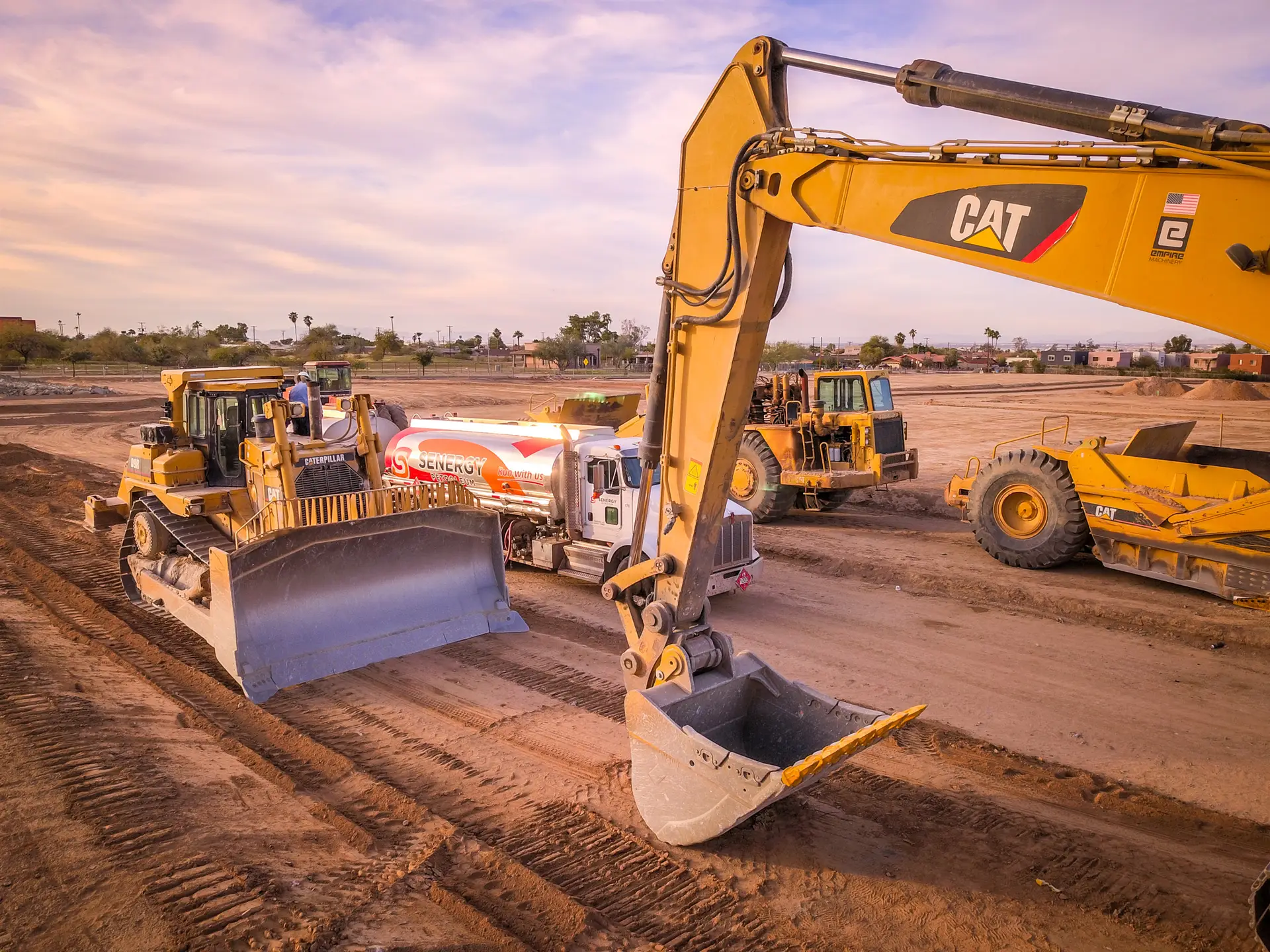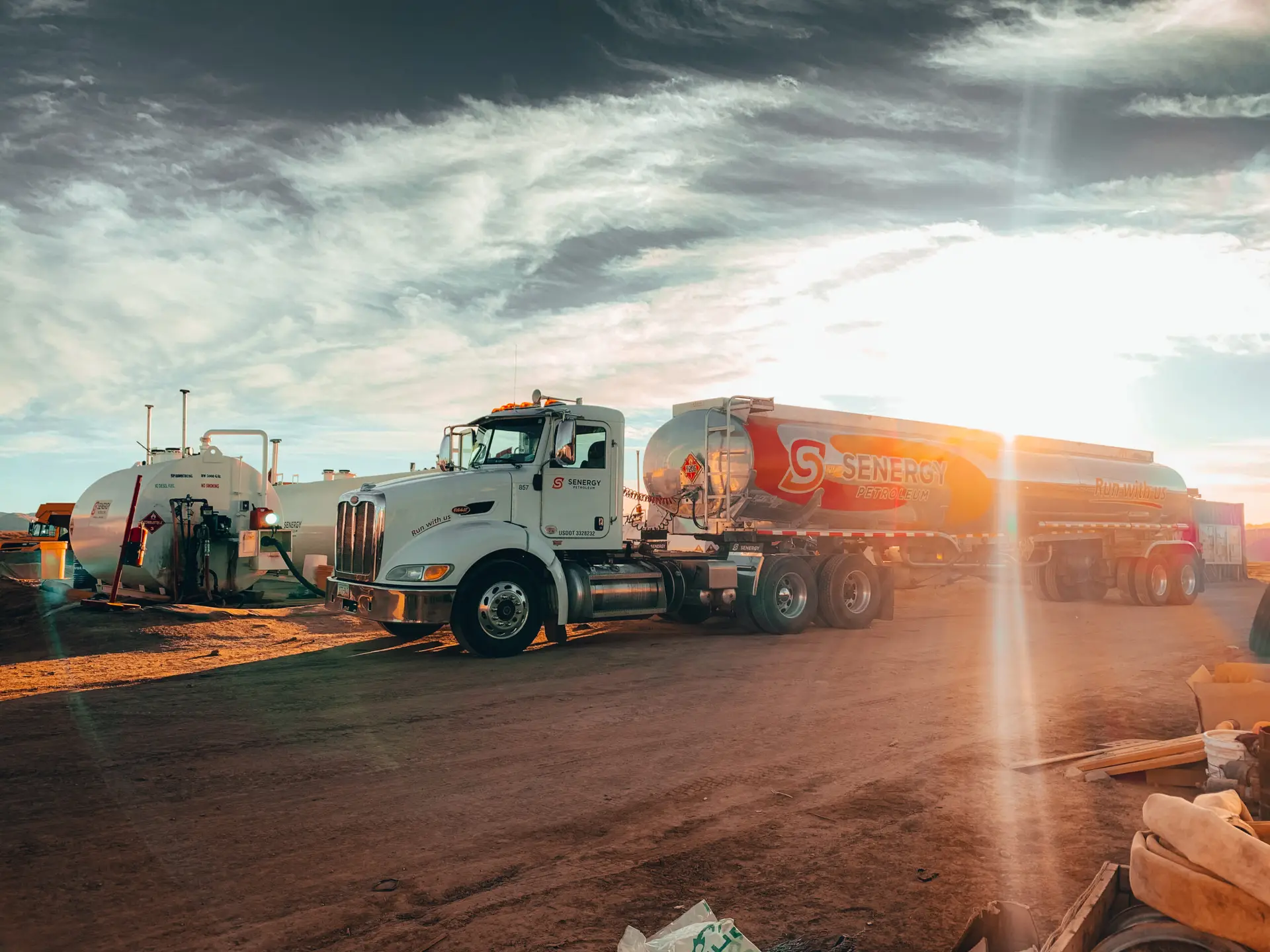Fuel Management Tips for Construction Companies
Every construction site relies on fuel to keep operations moving. Excavators, bulldozers, cranes, and generators all depend on reliable and efficient fueling to perform at their best. However, fuel remains one of the most commonly mismanaged resources in the construction industry. Without proper fuel management, companies risk unnecessary downtime, rising costs, and operational inefficiencies.
At Senergy Petroleum, we know that effective fuel management goes beyond keeping tanks full—it’s about making every gallon count. From on-site fueling to bulk fuel delivery, the right strategies help maximize equipment uptime, reduce waste, and keep projects on schedule.
Driving Profitability Through Better Fuel Management
Fuel makes up a substantial portion of total project costs, and mismanagement—whether through waste, theft, or poor planning—can quickly erode profit margins. Effective fuel management not only helps control expenses but also improves efficiency, extends equipment life, and keeps operations running without interruption.
A well-designed fuel plan ensures that fuel is available where and when it’s needed. It promotes safety, prevents contamination, and enables accurate tracking of usage. With consistent monitoring and management, construction companies can make data-driven decisions that boost productivity and profitability.
Tracking and Analyzing Fuel Usage Across Equipment
The first step in managing fuel effectively is understanding how it’s used. Manual logs and handwritten records leave room for error, while modern fuel monitoring systems give real-time visibility into fuel levels, usage patterns, and equipment performance. By adopting fuel tracking software and telematics, construction companies can collect live data on usage patterns, idle times, and equipment performance. With automated tracking, managers can see which machines consume the most fuel, identify leaks, and detect inefficient behavior such as excessive idling. Telematics also allows data integration across multiple job sites, helping businesses plan fuel deliveries more accurately and avoid unnecessary trips to fuel stations.
This detailed insight helps streamline construction fuel management, ensuring the right quantity of fuel reaches each piece of equipment without over-ordering or under-supplying.
Using On-Site Fueling to Maximize Productivity
The first step to effective fuel management is understanding how fuel is used. Manual logs and handwritten records often leave room for error, while modern fuel monitoring systems provide real-time visibility into fuel levels, usage patterns, and equipment performance. By implementing fuel tracking software and telematics, construction companies can capture live data on consumption, idle time, and equipment efficiency.
With automated tracking, managers can identify high fuel consumers, detect leaks, and address inefficient behaviors such as excessive idling. Telematics also enables data integration across multiple job sites, allowing for more accurate delivery planning and fewer unnecessary trips to fuel stations.
This level of insight streamlines construction fuel management—ensuring every piece of equipment receives the right amount of fuel, right when it’s needed.


How Bulk Fuel Solutions Help Construction Firms Reduce Costs
One of the most effective ways to improve fuel management is through bulk fuel delivery. Purchasing fuel in larger volumes allows construction companies to secure more competitive pricing and minimize exposure to market fluctuations. Having a consistent fuel supply delivered directly to the job site also eliminates wasted time spent refueling at off-site locations.
A dependable fuel delivery partner can monitor tank levels, schedule deliveries based on usage, and uphold strict quality standards. For operations managing multiple job sites, coordinated bulk deliveries ensure every location receives the diesel it needs—on time and without interruption. This approach not only reduces costs but also enhances productivity by keeping equipment fueled and ready to work.
When combined with automated monitoring and scheduled deliveries, bulk fuel programs offer complete transparency, stronger budget control, and improved operational efficiency.
Reducing Fuel Waste and Inefficiency on Job Sites
Fuel waste often goes unnoticed, caused by idling equipment, inadequate maintenance, or improper handling. To improve efficiency, it’s essential to address these issues directly.
Regular engine maintenance—such as timely oil changes and air filter replacements—keeps machinery performing at its best. Training operators to shut down engines during breaks and avoid aggressive acceleration also helps reduce unnecessary fuel consumption.
Building a workplace culture that prioritizes fuel efficiency delivers long-term benefits. When operators recognize how small actions—like limiting idle time and monitoring gauges—impact overall project costs, they become active participants in effective fuel management.
Additionally, advanced monitoring tools can identify discrepancies between recorded and actual fuel use, helping detect theft or losses before they affect operations.
Protecting Fuel Assets with Proper Storage and Security
Fuel is one of the most valuable assets on a construction site, and protecting it from theft and contamination is critical. Proper diesel storage and maintenance are key components of any effective fuel management plan. Storage tanks should be double-walled or equipped with secondary containment to help prevent leaks, while regular inspections, filtration, and water-separation procedures keep fuel clean and equipment running efficiently. Even minimal contamination can lead to injector issues and costly downtime.
To enhance security, companies can install telemetry sensors and smart locks on tanks to monitor access in real time. This technology alerts managers to irregular withdrawals, ensuring that every gallon is tracked and used as intended.
How Technology Is Redefining Fuel Management in Construction
Technology has reshaped the way construction companies manage fuel. Modern fuel management systems now integrate seamlessly with telematics, GPS tracking, and digital reporting tools to deliver real-time visibility and control.
Instant access to tank levels, consumption data, and delivery schedules allows teams to respond quickly to changing site needs. Automated alerts can notify managers when fuel levels are low or when irregular usage occurs. For contractors overseeing multiple job sites, centralized data improves coordination between refueling teams and project managers.
This data-driven approach strengthens efficiency, simplifies reporting, and supports accurate cost analysis. With the right technology in place, companies can make proactive adjustments—optimizing routes, scheduling refuels strategically, and minimizing waste before it impacts operations.
Ensuring Safety and Environmental Compliance
Fuel handling carries inherent risks, particularly in active construction environments. To maintain safety and operational reliability, companies should establish strict refueling procedures supported by thorough staff training programs.
All personnel must know how to manage spills, operate fire suppression equipment, and follow proper refueling protocols. On-site tanks should include secondary containment and undergo regular inspections to ensure compliance and safety.
A strong safety program not only protects crews and equipment but also reinforces the company’s reputation for professionalism and reliability. Safe and efficient fuel management keeps projects running smoothly and reduces costly interruptions.
Fuel Efficiency: The Key to Stronger Performance and Profitability
In today’s construction industry, efficient fuel management directly supports profitability and long-term success. Optimizing storage, delivery, and refueling logistics helps reduce costs, improve reliability, and strengthen overall project performance.
Integrating data from modern fuel management systems provides valuable insight into consumption patterns, helping companies plan more accurately, eliminate waste, and maintain accountability across multiple job sites. Effective fuel strategies not only enhance day-to-day operations but also demonstrate a commitment to efficiency and professionalism that clients can trust.
Your Partner in Smarter Fuel Management
Fuel powers progress—but managing it strategically drives success. Every improvement in monitoring, delivery, and usage leads to greater profitability and smoother operations. By applying these fuel management best practices, construction companies can reduce waste, enhance productivity, and maintain consistent performance across every job site.
Partnering with a trusted supplier ensures dependable deliveries, premium-quality diesel, and data-driven support. Run With Senergy Petroleum—your partner in efficient fueling, advanced monitoring, and reliable solutions that keep construction projects moving forward.

